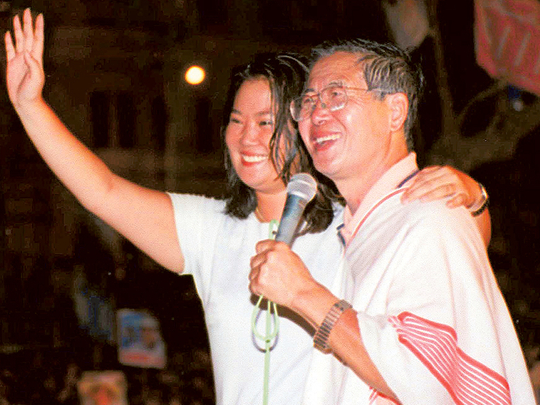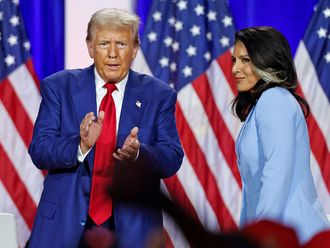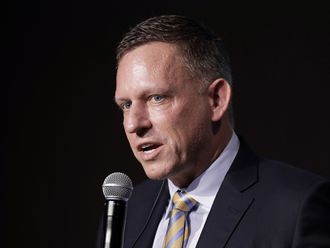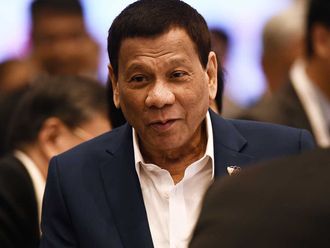
Lima: Father is in jail for crimes against humanity. Uncles and aunts have fled corruption charges. And daughter? She is in position to follow in dad’s footsteps by becoming president of Peru.
The Fujimoris may look like one of Peru’s most dysfunctional families, but they are also one of its most powerful. And although ex-president Alberto Fujimori, 77, is in jail, his children are looking to forge a dynasty.
His daughter Keiko, 40, is close to being elected Peru’s first woman president in elections this coming Sunday.
That is in spite — or because — of the violence and drama of Alberto Fujimori’s time as leader and in his own family.
Fujimori seized vast powers by dissolving parliament and massacring leftist opponents.
Keiko’s mother Susana Higuchi accused his men of torturing her during his rule from 1990 to 2000. She fled the presidential palace and filed for divorce in 1994.
Keiko took over from her mother as first lady of the nation at the age of 19.
“She has remained among the most popular figures in Peruvian politics since then,” said Maria Luisa Puig, a Latin America analyst at the Eurasia Group consultancy.
The Fujimoris are one of thousands of families of Japanese descent in Peru following waves of economic immigration.
The family maintains strong ties to Japan.
Alberto Fujimori fled there as allegations against him mounted in 2001. He resigned as president by sending a fax.
He was arrested years later in Chile and extradited to Peru to face trial.
In 2009 he was sentenced to 25 years in prison for death squad killings targeting supposed members of the Shining Path guerrilla group in the 1990s. He has also been convicted of embezzlement and bribery.
Aside from his own challenges, Alberto Fujimori’s marriage to Higuchi was a dramatic affair.
She said she was tortured by the secret service run by Fujimori’s right-hand man, Vladimir Montesinos.
Shortly after their divorce, Higuchi ran against Fujimori in an election in 1995. But he blocked her by passing a law that prohibited presidents’ close family members from seeking office.
Keiko Fujimori has rejected her mother’s claims as “myths.”
Higuchi has appeared at some of Keiko Fujimori’s recent campaign events, but they are not reputed to have warm relations.
Alberto Fujimori’s sisters, Juana and Rosa, and his brother, Pedro, are all on the run from the courts on corruption charges.
They are accused of embezzling money donated to non-governmental organisations they ran when he was president.
The sisters fled to Japan and Pedro to the United States, where the family says he died three years ago.
Fujimori’s youngest brother Santiago is an elected member of congress. So is Keiko’s brother Kenji, the youngest of the ex-president’s children.
Kenji has said he too hopes to be president one day.
The elder of Keiko’s two younger brothers, Hiro, recently returned to Peru from a spell in Japan.
He has joined the boards of two companies in which his brother Kenji holds shares.
The last of the Fujimori children, Sachi, has stayed away from politics. She is an architect.
Fujimori senior is in ailing health in jail. But he still casts a shadow over public life in this nation of 30 million people — a relative economic success story in Latin America in recent years.
Polls indicate Keiko’s likely share of Sunday’s vote — roughly one-third — would carry her through to a runoff.
Her level of support reflects a split in views of her father’s legacy.
Keiko “has a sizeable group of core supporters ... largely due to the legacy of her father’s administration, which is perceived by a sector of the electorate as a success due to economic recovery and a crackdown on leftist insurgencies,” Puig said in an analysis note.
At the same time, however, “the main obstacle to Keiko’s bid for the presidency remains on the links to the government of her father ... This prompted her to sign a pledge in the (election) debate to defend human rights, respect democracy, and refrain from favouring her family if elected.”












